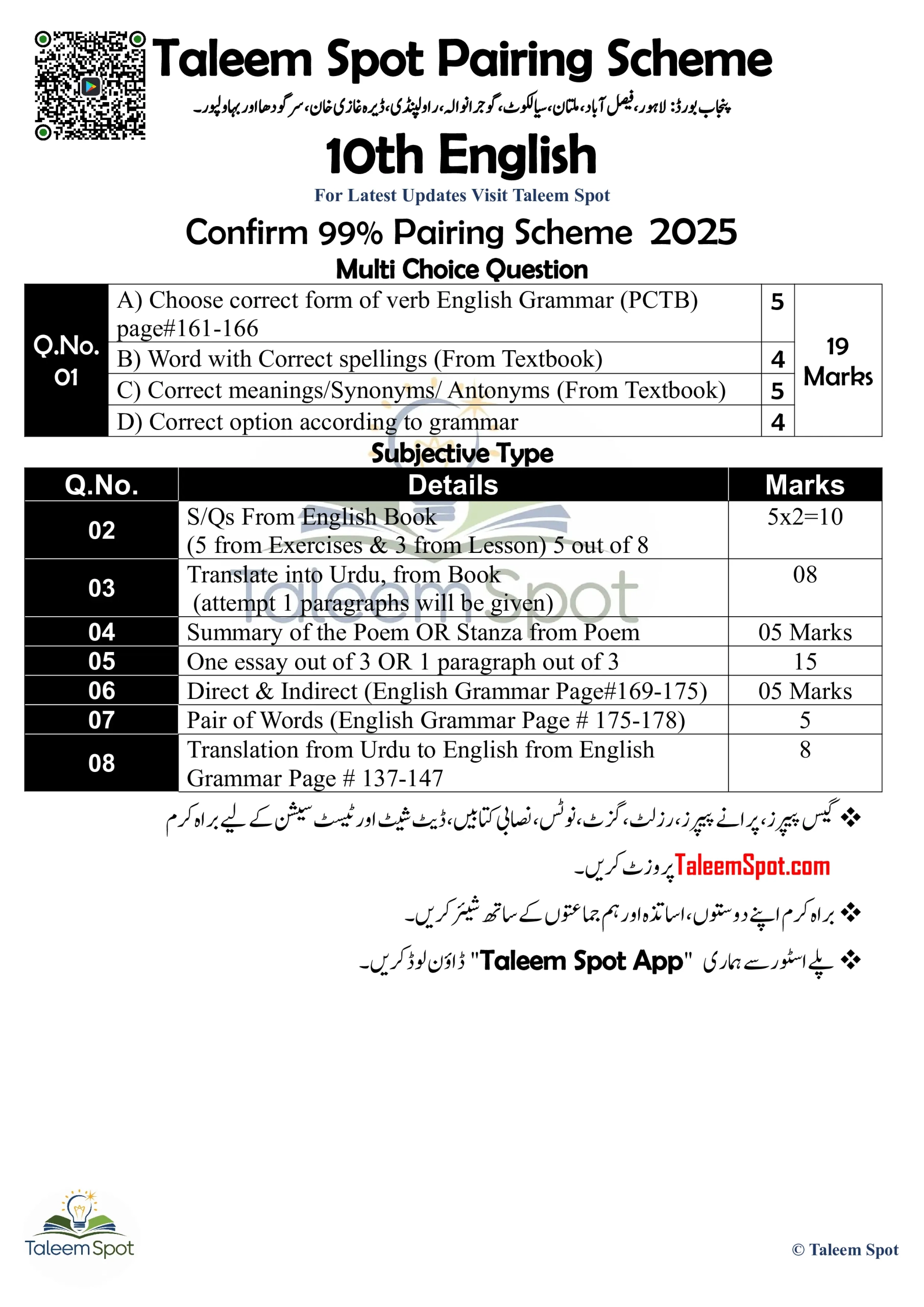10th Class English Pairing Scheme Punjab Board 2025

The 10th Class English Pairing Scheme Punjab Board 2025 is an essential tool for students preparing to score high in their English exams. English is a core subject in the matriculation curriculum, requiring mastery in grammar, comprehension, essay writing, and creative expression. For students under all Punjab Boards, including Lahore, Rawalpindi, Multan, Gujranwala, Faisalabad, Bahawalpur, Sahiwal, Sargodha, and Dera Ghazi Khan, this pairing scheme provides a focused approach to studying the subject effectively.
Each year, thousands of students appear for the 10th-grade exams, but many struggle to achieve passing marks in English due to a lack of proper guidance. The pairing scheme highlights important chapters, grammar exercises, and writing topics, ensuring efficient and targeted preparation. By following this scheme, students can reduce exam stress, manage time better, and significantly improve their scores.

All Subjects Pairing Scheme : Visit Here
Importance of the 10th Class English Pairing Scheme Punjab Board 2025
The 10th Class English Pairing Scheme Punjab Board 2025 simplifies the syllabus by breaking it down into manageable sections. English is a subject that tests both language skills and critical thinking, making a structured approach essential for success.
Key Benefits of the English Pairing Scheme
- Focused Preparation:
The pairing scheme identifies chapters and topics with the highest weightage, enabling students to focus their energy where it matters most. - Efficient Time Management:
By highlighting important areas, the scheme helps students allocate their study hours wisely, covering both grammar and literature sections effectively. - Enhanced Confidence:
Knowing which questions and topics are more likely to appear reduces exam anxiety, allowing students to approach the paper with confidence. - Improved Passing Rates:
Studies show that students who follow the pairing scheme are more likely to pass, as it ensures comprehensive coverage of high-priority topics.
Core Sections of the 10th Class English Syllabus
English is divided into multiple sections that test students’ skills in reading, writing, and grammar. Here’s a breakdown of the key areas:
1. Short Questions
- Focuses on comprehension and understanding of key lessons.
- Tests students’ ability to recall information and provide precise answers.
2. Grammar
- Includes topics such as tenses, active and passive voice, direct and indirect speech, synonyms, and antonyms.
- Requires consistent practice for accuracy.
3. Essay Writing
- Tests creativity and writing skills.
- Common topics include My Best Friend, Pollution, and Importance of Education.
4. Letter/Application Writing
- Assesses formal writing skills.
- Popular topics include applications for leave and letters to friends or authorities.
5. Translation and Comprehension
- Involves translating Urdu sentences into English and answering questions based on a given passage.
- Tests reading comprehension and language understanding.
The pairing scheme ensures that students allocate enough time to each section based on its importance and weightage in the exam.
How the Pairing Scheme Benefits Different Punjab Boards
The 10th Class English Pairing Scheme Punjab Board 2025 is designed to cater to the needs of students across all major boards, ensuring uniformity in preparation and exam patterns. Here’s how it benefits students from each board:
1. 10th Class English Pairing Scheme Lahore Board 2025
For Lahore Board students, the pairing scheme highlights comprehension and essay writing, which are often emphasized in exams.
2. 10th Class English Pairing Scheme Rawalpindi Board 2025
Rawalpindi Board frequently tests grammar and translation skills. The pairing scheme ensures these areas are well-prepared.
3. Multan Board 10th Class English Pairing Scheme 2025
Multan Board students benefit from a focus on letter writing and short questions, which are commonly included in their exams.
4. Gujranwala Board 10th Class English Pairing Scheme 2025
Gujranwala Board places emphasis on essay writing and grammar exercises. The pairing scheme ensures balanced preparation for these sections.
5. Faisalabad Board 10th Class English Pairing Scheme 2025
For Faisalabad Board, the pairing scheme highlights critical comprehension passages and important grammar rules.
6. Bahawalpur Board 10th Class English Pairing Scheme 2025
Bahawalpur Board exams often include challenging translation exercises. The pairing scheme ensures these are adequately practiced.
7. 10th Class English Pairing Scheme Sahiwal Board 2025
Sahiwal Board students can focus on both creative writing and grammatical accuracy using the pairing scheme.
8. Sargodha Board 10th Class English Pairing Scheme 2025
Sargodha Board frequently tests letter writing and comprehension. The pairing scheme ensures thorough preparation for these sections.
9. Dera Ghazi Khan Board 10th Class English Pairing Scheme 2025
DG Khan Board students benefit from focusing on essay writing and short questions, which are commonly asked.
Tips for Effective Preparation Using the Pairing Scheme
1. Start Early
Begin your preparation months in advance to cover all important topics and leave time for revision.
2. Master Grammar
Practice grammar exercises daily, focusing on tenses, voice changes, and sentence structure.
3. Improve Writing Skills
Regularly practice essays, letters, and applications to enhance your writing fluency and coherence.
4. Work on Comprehension
Read passages and practice answering questions to improve your understanding and analytical skills.
5. Memorize Key Phrases
Learn useful phrases and vocabulary for essays and letters to make your writing more impactful.
6. Review Past Papers
Solve past papers to familiarize yourself with question patterns and improve your time management.
7. Seek Feedback
Share your written work with teachers or peers to identify areas for improvement.
Findings
The 10th Class English Pairing Scheme Punjab Board 2025 is a must-have resource for every student aiming to excel in their English exam. By breaking the syllabus into focused sections, the pairing scheme provides a clear roadmap for effective preparation. Whether you are under the Lahore Board, Rawalpindi Board, or any other Punjab Board, this scheme ensures a balanced and comprehensive approach to studying English.
English is not just a subject; it is a skill that plays a crucial role in higher education and professional life. With regular practice, a solid understanding of the pairing scheme, and consistent effort, students can overcome their challenges and achieve their desired grades.
FAQs
Q1: What is the purpose of the 10th Class English Pairing Scheme Punjab Board 2025?
The pairing scheme helps students focus on key topics and sections that are most likely to appear in the exam.
Q2: Is the pairing scheme uniform across all Punjab Boards?
Yes, the scheme is standardized for all Punjab Boards, including Lahore, Rawalpindi, Multan, and others.
Q3: What are the key sections of the English syllabus?
The syllabus includes short questions, grammar, essay writing, letter writing, comprehension, and translation.
Q4: How does the pairing scheme improve preparation?
It streamlines preparation by highlighting high-weightage topics and ensuring efficient time management.
Q5: How can I prepare for essay writing?
Practice writing essays on common topics and focus on improving structure, coherence, and grammar.
Q6: Is grammar important in the English exam?
Yes, grammar is a critical component, as it is tested in both comprehension and sentence correction exercises.
Q7: Can I rely solely on the pairing scheme for preparation?
While the pairing scheme is a helpful guide, combining it with past papers and consistent practice ensures better results.
Q8: How should I prepare for the comprehension section?
Read passages carefully and practice answering questions with clarity and precision.
Q9: How important is translation in the English exam?
Translation is essential as it tests your understanding of both English and Urdu languages.
Q10: Where can I find the 10th Class English Pairing Scheme Punjab Board 2025?
The pairing scheme is available through your school, teacher, or the official website of your respective board.



